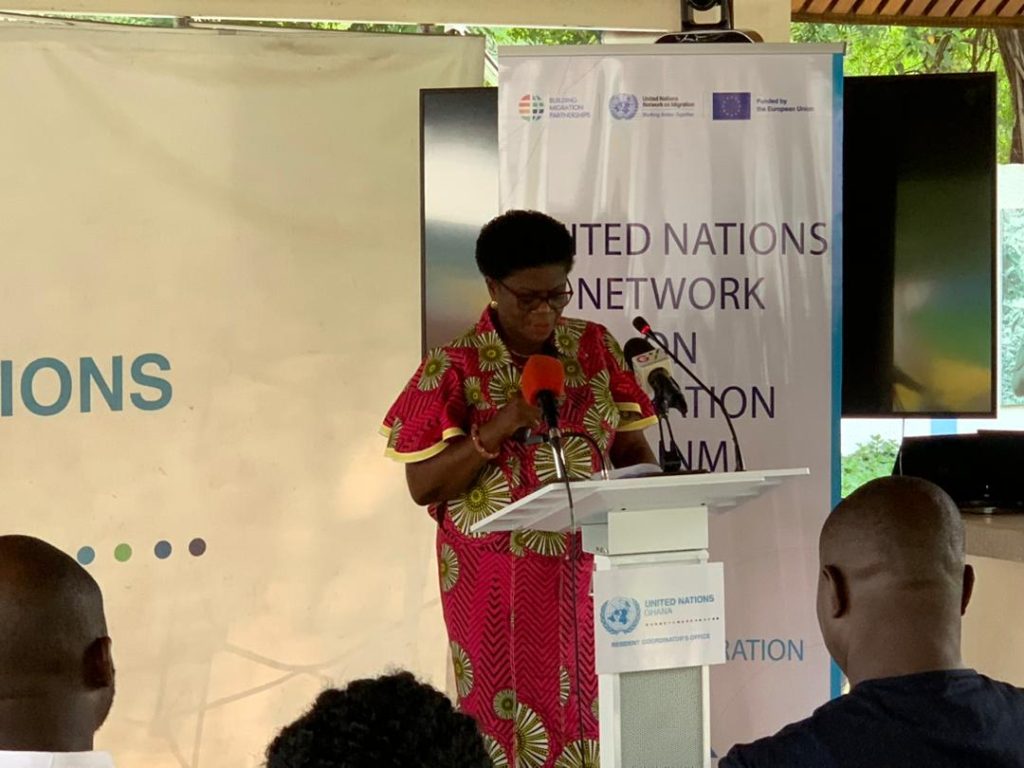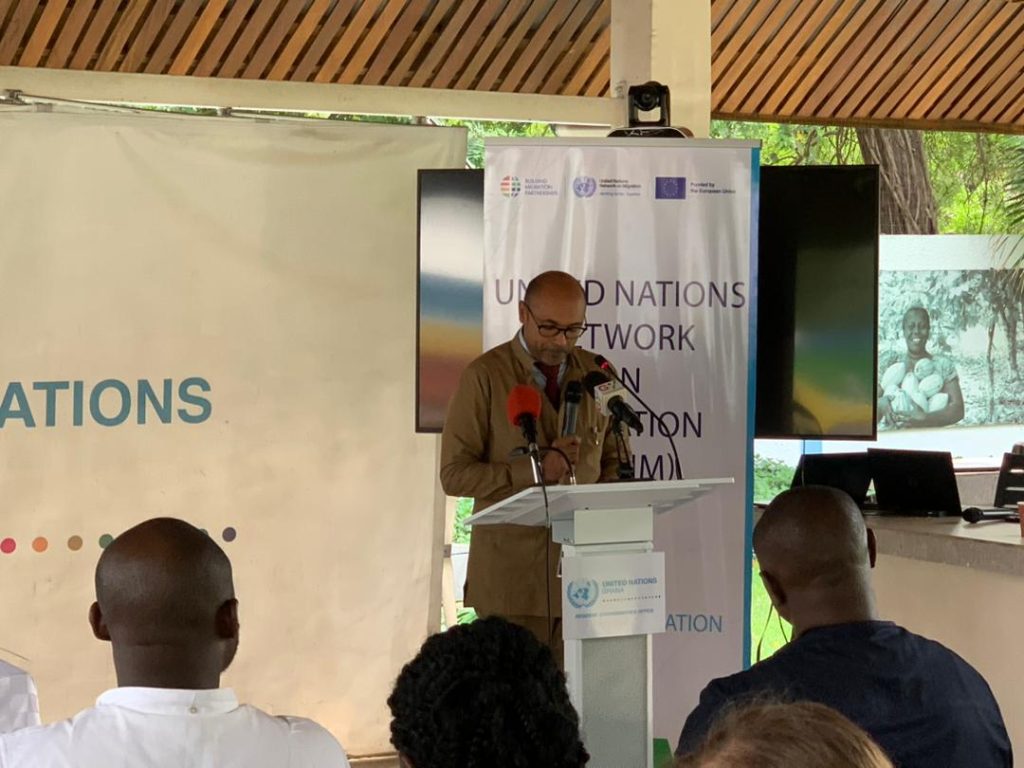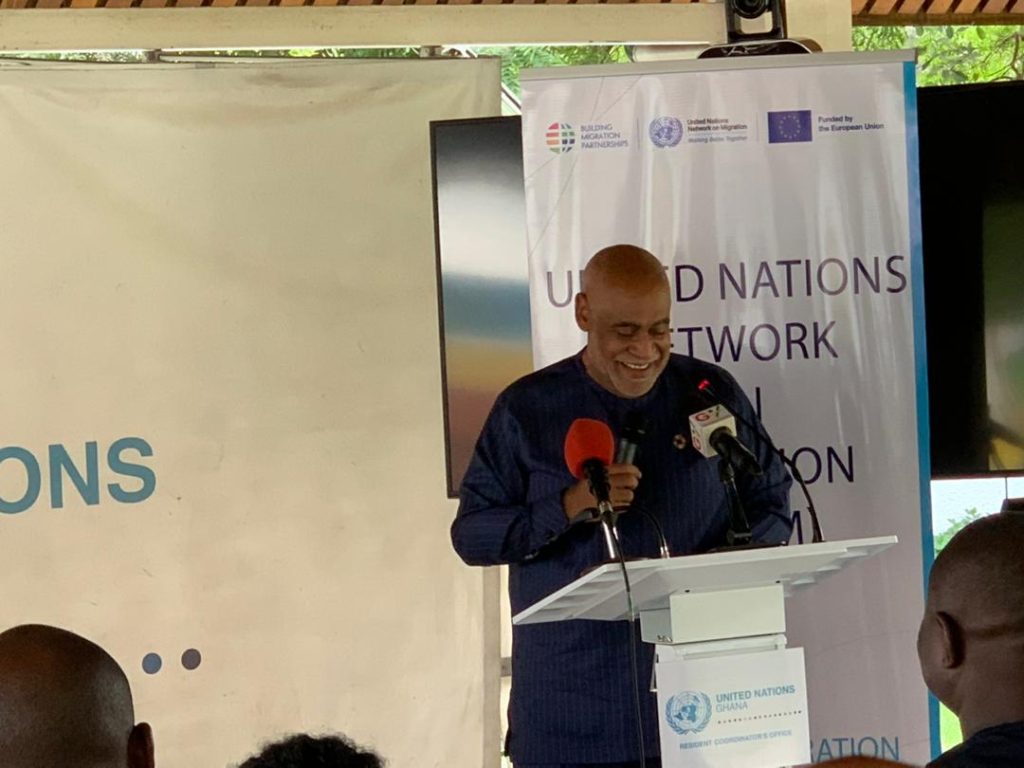By Stanley Senya
Accra, Feb. 23, GNA – The United Nations Network on Migration (UNNM), and the European Union (EU), in collaboration with the Migration Unit of the Ministry of Interior has launched the “Building Migration Partnership” project in Ghana.
The launch which took place in Accra, on Wednesday, February 2022 was graced by dignitaries from the European Union, United Nations, and representatives from the Ministry of interior in Ghana.
The project dubbed, “Building Migration Partnership” will build the capacity of key stakeholders in the migration sector, including the Government of Ghana for effective implementation of the country’s National Migration Policy towards safe, orderly, and regular migration with the goal of making migration work for sustainable development.
The project implemented by the International Organisation for Migration (IOM), also seeks to strengthen, and leverage whole-of-UN expertise to support good migration governance in the country.

Mr Ambrose Dery, Minster of the Interior, whose speech was read on his behalf, said: “As Ghana has signed up to the Global Compact for Migration, we, as policy makers, are working to put in place measures to manage our migration programmes effectively to derive migration benefits for the country’s social and economic development.”
“This project is crucial in supporting Ghana’s migration governance. It reflects a true commitment to building migration partnerships which is also geared towards achieving the Sustainable Development Goals”.
The institutional and technical capacity building will be supported through operational guidance and tools that have been developed by the Network.
The Minister thanked the European Union and the United Nations Office in Ghana for funding and supporting Ghana’s migration governance drive.
He said, this was a true reflection of building partnerships which was also geared towards achieving targets and the Sustainable Development Goals.
“The Ministry of the Interior is looking forward towards this collaboration to build a national board meeting with all relevant stakeholders as efforts in implementing the National migration policy. “He added.

Mr Irchad Razaaly, European Union’s (EU) Ambassador to Ghana, said, the project highlighted the linkages between migration and all sectors, such as agriculture, finances, and health.
“This is why I am glad that it will contribute to building migration-related capacities in different ministries and in various UN agencies.”
He said Ghana had made important strides in recent years towards improving its migration policy framework, notably through the development of a National Migration Policy.
In addition to supporting the implementation of this policy, the project will help the Government of Ghana achieve the 23 objectives set under the Global Compact for Safe, Orderly and Regular Migration, through the formulation and development of a comprehensive five-year Plan of Action, he said.
Through this project, the Government of Ghana, the UN system, and the European Union are therefore coming together as partners to strengthen safe and regular migration.
The EU-UN Building Migration Partnership Programme will take place over the next two years in only three countries, namely El Salvador, Indonesia, and Ghana. In Ghana, it will be implemented by IOM on behalf of the UN Network on Migration.
This unique project primarily aims to contribute to the implementation of the Global Compact for Migration, by strengthening the capacity of both the Government and UN system in Ghana.
He said the EU was very active on diaspora engagement through several projects such as the platform for remittance.
On migrant protection, he said projects were in place to support the fight against human trafficking in the Gulf of Guinea.
“We are supporting Ghana on board and managing precisely to address the spill over on the Gulf of Guinea,” he concluded.

Mr Charles Abani, United Nations (UN), Resident Coordinator in Ghana, in his remarks, said: “partnership and coordination is the goal for the UN. In whatever we do, we must ensure there is a joined-up approach to our actions that leverages all expertise to deliver lasting and sustainable outcomes.”
This is especially true for cross-cutting issues such as migration. With this project, and through the UN Network on Migration, we can demonstrate our intentional approach to deliver as one and be more responsive to the needs of the Government of Ghana as far as migration is concerned.”
He commended the European Union for supporting building partnerships for effective migration governance in Ghana.
This support is critical to delivering transformative Sustainable Development Goals (SDG), particularly goal 10, project 10.7 on facilitating safe, orderly, and regular responsible migration, and implementing the Global Compact on migration.
“Once again, majority of international migration occurs due to economic crisis, but also supports economic growth of a country simultaneously. And so, we must not see migrants as the beneficiaries but for the growth of the country.” He advised.
The launch was preceded by a media briefing segment attended by national editors and journalists who play a key role in contributing to balanced migration reporting and positively changing the narrative on migration.
GNA